
Criteria
What are the virtues of a good colour commentator? Some of it is going to be personal bias, as everyone has their own benchmarks.
In general, there are a few key criteria we can use to objectively gauge a performance.
- A distinctive voice
- Works well with a partner(s)
- Knowledge of the sport
- Positive energy, keeps things accessible
- Longevity
The person needs to have a distinctive and personable voice. Just like in real life presentations, movies and everyday conversations, people don’t like listening to someone who is monotone and deadbeat.
Commentators need to convey the mood and drama of the game by varying the pitch of their voice, adjusting their pace, using emphasis, pausing and using inflection when appropriate. A perfect example of this is former legendary Los Angeles Dodgers’ sportscaster, Vin Scully.
A good commentator also works well individually or when partnered with others, meshing with them seamlessly. They ask the right questions and form easy chemistry, playing off the other person’s strengths and filling in for any shortcomings.
Most importantly, the best of the best actually know the sport and offer interesting and timely analysis. It’s definitely ironic when the person calling the game knows less than the viewer. You don’t even necessarily need to have played the game either. Many former athletes come onto broadcasts, only to provide vague and sometimes idiotic insight. Think Ryan Hollins.
To paint an accurate picture, the commentator needs to be prepared ahead of time with relevant anecdotes, stats, trends, and historical comparisons. In the moment, they need to breakdown the strategies being used, tactics executed and developments (i.e. injuries) as they happen. They must relay all this information with positive energy and avoid excessive mumbo jumbo, keeping things accessible for the general audience.
Longevity is important too. If they hit all the above points, good sportscasters generally enjoy extended careers, leaving a lasting impression on viewers.
